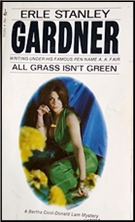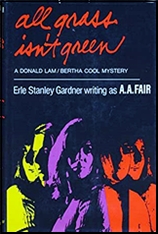Sat 17 Dec 2022
A PI Mystery Review: ERLE STANLEY GARDNER writing as A. A. FAIR – All Grass Isn’t Green
Posted by Steve under Reviews[2] Comments
ERLE STANLEY GARDNER writing as A. A. FAIR – All Grass Isn’t Green. Bertha Cool & Donald Lam #29. William Morrow, hardcover, 1970. Pocket, paperback, April 1971. Reprinted several times.

There is a small disagreement in the mystery world about the numbering of this book in the series. The one that was theoretically intended to be number two, The Knife Slipped, was rejected by William Morrow, Gardner’s hardcover publisher – on grounds of being too racy – and did not see the light of day until 2016. (Goodreads calls it book #1.5, and I think they have the right of it.)
What is true is that All Grass Isn’t Green is the final book in the series, and since Gardner is said to have been ill at the time, many reviewers have called it out as being one the weakest. More on that later.
Lam, as the active member of the two-person detective agency (plus a small staff or perhaps only two), is hired by a fairly reticent client to find a man for him. Why, he won’t say. Lam agrees, but with reservations. He quickly learns that the missing man is a freelance writer, that his girl friend has also moved out very suddenly, and that the trail for both leads to Mexico.

That makes up the first third of the book, and Lam’s investigation, as he tells it, is both fun and very much worth following. The middle third is another story altogether. Once in Mexico, Lam discovers that the missing man was very foolishly putting together a story about the marijuana trade. (Hence the title.) Smuggling, that is, and when one of the gang turns up dead, it is somehow Lam’s client who is arrested for the murder.
The story meanders around considerably in this section, with lots of uninteresting routine and repeated trips on Lam’s part back and forth across the border. It’s not until the preliminary hearing that the story picks up again, and with a vengeance. Lam cannot act as a lawyer, so he has to hire one for his client, but in the middle of the proceedings, convinces his client to fire the fellow and to act as his own attorney, with Lam whispering to him what questions to ask.
So the book ends in fine fashion, albeit without the twist in the tale you might expect. The verdict on the book itself is therefore definitely mixed, but I’m glad I finally managed to catch up with this one. As for Bertha Cook, she fries a lot of oysters, but her role is otherwise inconsequentially small. (She never had a large one, or did she?)
December 18th, 2022 at 8:43 pm
Bertha’s biggest role, and Effie’s, were the two wartime Lam adventures when Donald was off in the Army. Beyond that she mostly appeared at the start and end and sometimes somewhere in the middle to lay out the case and sometimes run interference with the police or the client.
Granted this one isn’t the best, but for the 29th entry in the series its a good one despite the sagging middle section.
Mostly it reminds me how much I miss Lam and company.
December 18th, 2022 at 9:12 pm
A slight correction, if you’ll allow me, David. Not Effie, in this case, but Elsie, as in Elsie Brand.
But as for the last line of your comment, I second the motion!